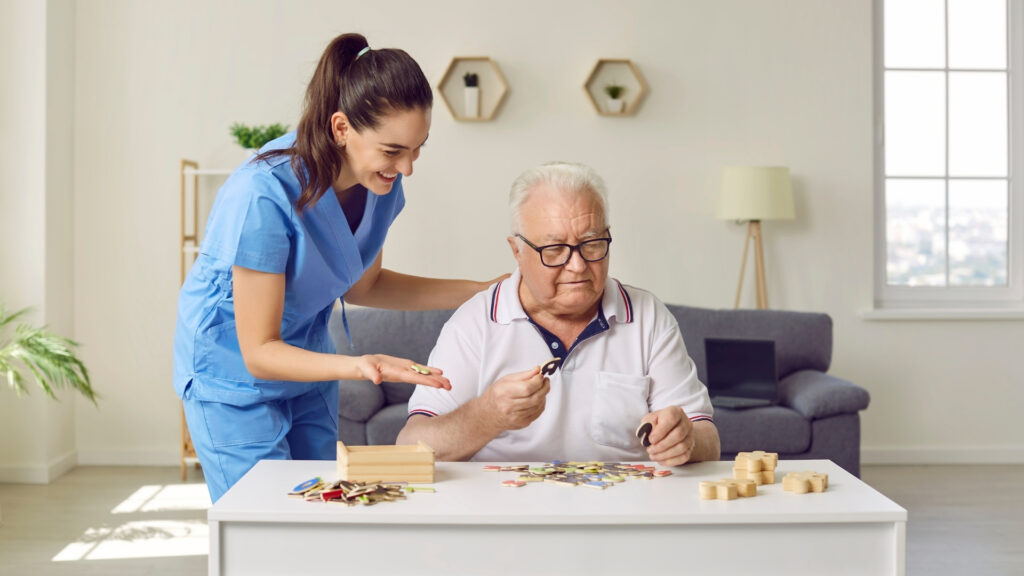What are cognitive deficits and how can they be treated?

Contents:
- Cognition? What is that actually?
- Cognitive deficits are not uncommon
- What are cognitive deficits after a stroke?
- Types of cognitive deficits after a stroke
- The importance of an accurate diagnosis
- Therapeutic approaches for cognitive deficits
- Technological advances in cognitive rehabilitation
- The role of support from relatives
Cognition – what is it actually?
The terms „cognitive“ and „cognition“ both refer to mental processes, but they have different meanings and applications.
Cognition: Cognition refers to all mental processes or activities related to the acquisition, processing and understanding of information. This includes perception, attention, memory, thinking, language and problem solving. In other words, cognition refers to the entire spectrum of mental abilities that enable us to understand and navigate the world around us. When we talk about cognition, we are looking at the big picture of mental functioning.
Cognitive: The term „cognitive“, on the other hand, refers to everything that has to do with cognitive processes or cognition. So when we say that something is „cognitive“, we are referring to the fact that it has to do with thinking, understanding or other aspects of mental performance. For example, we can say that cognitive therapy uses techniques that aim to improve or change thought processes. Or we could say that someone has a cognitive impairment, which means that their ability to think, learn or remember is impaired.
Cognitive deficits are not uncommon
Cognitive deficits, or impairments or limitations of cognitive abilities, can affect anyone. Brain diseases such as strokes, traumatic brain injuries, Alzheimer’s or multiple sclerosis can lead to cognitive impairment at any age. Mental illness, side effects of certain medications or drug abuse can also lead to deficits. Cognitive deficits can have a significant impact on the quality of life of those affected and impair their daily functioning. It is important to emphasize that an accurate diagnosis and early identification of cognitive deficits are crucial to enable targeted therapy. Rehabilitation can include various approaches, including cognitive training, occupational therapy, speech therapy and psychotherapeutic support.
Cognitive deficits after a stroke
After a stroke, cognitive deficits occur in up to 80% of patients. These impairments can affect various areas of cognitive function, including memory, attention, language and problem-solving skills. The severity of the deficits varies depending on the individual case. Some sufferers experience only mild impairments, while others face more severe challenges.
What cognitive deficits can occur after a stroke?
Cognitive deficits refer to impairments in various cognitive areas such as memory, attention, problem-solving skills and language. After a stroke, these deficits can occur due to damage to the brain that impairs normal function.
- Memory problems: A person with memory problems due to a cognitive impairment may have difficulty remembering new information or recalling events from the past. They may forget important appointments or tasks, fail to remember conversations or agreements or have difficulty learning new skills.
- Problems with attention: People with cognitive impairments can have difficulty concentrating on a task for long periods of time or ignoring distracting stimuli. They can quickly lose interest, have problems following instructions or absorbing information from a conversation.
- Language challenges: Some people with cognitive impairments may have difficulty understanding language or expressing themselves. They may have problems understanding complex sentences, finding words or expressing themselves fluently.
- Difficulties with problem solving: People with cognitive impairments may have difficulty recognizing problems, finding alternative solutions or making rational decisions. They may also have difficulty assessing the consequences of their actions or reacting appropriately to the situation.
- Limited spatial understanding: Some people with cognitive impairments may have difficulty understanding spatial relationships or finding their way around unfamiliar environments. They may get lost, not recognize landmarks or have problems with complex visual information.
What all these problems have in common is that they make themselves felt in everyday life. For many of those affected, tasks that used to be taken for granted, such as shopping or making coffee, become a challenge or even impossible.
The importance of an accurate diagnosis
An accurate diagnosis is crucial in order to identify the specific cognitive deficits and create a customized treatment plan. Neurological tests, imaging techniques and discussions with the patient can help to understand the individual challenges.
How can cognitive deficits be treated?
The importance of an accurate diagnosis
An accurate diagnosis is crucial in order to identify the specific cognitive deficits and create a customized treatment plan. Neurological tests, imaging procedures and discussions with patients can help to understand the individual challenges.
Therapeutic approaches for cognitive deficits
Contrary to many preconceptions, cognitive deficits can be treated. Because our brain remains capable of learning for a lifetime. As part of the rehabilitation process, cognitive impairments are treated, for example. accompanied by occupational therapists. The aim is to restore or improve lost or impaired cognitive abilities. This is done through targeted exercises and tasks that are tailored to the specific deficits.
Brain performance training: Also known as brain training or cognitive training, brain performance training involves a variety of exercises and activities designed to improve or maintain the brain’s cognitive abilities. These include, for example, memory, problem-solving skills, concentration and spatial thinking. Puzzles, crossword puzzles, labyrinths or Sudoku are often used as training material. Computer-assisted training is the standard therapy. Unfortunately, these therapy methods are very abstract. This means, for example, playing memory games on the PC or training exercises in which all fish of one color are clicked on. A good result in such exercises is not the same as rehabilitation progress in real life.
Technological advances in cognitive rehabilitation
Virtual reality is increasingly being used in medicine to develop interactive and personalized therapy programs. We have developed our own VR therapy, teora mind, to make cognitive training closer to everyday life, more effective and more intuitive. There, those affected can practise everyday tasks in virtual reality in a controlled environment without danger and thus improve their cognitive abilities. Various therapy environments and exercises are available to them for this purpose. In our virtual kitchen, for example, you can make coffee, put away the shopping, sort out the fridge or prepare fruit salad. The focus on everyday training is part of our philosophy. We believe that effective therapy should be geared towards the problems and challenges of everyday life in order to help those affected back into life. We take care to clearly define the training goals at the beginning of the exercises and to create a pleasant atmosphere through the attractively designed training environment. The tasks should be fun so that those affected enjoy practicing them often. Regular training increases the success of the therapy.
The role of support from relatives
Support from family and friends plays a crucial role in coping with cognitive deficits. Patience, understanding and positive reinforcement can help to promote the rehabilitation process.
Overall, it is clear that early diagnosis and targeted therapeutic approaches are crucial to improving the prognosis after a stroke. The individual adaptation of therapy to specific cognitive deficits and the integration of modern technologies offer promising paths to successful rehabilitation. Patients should actively participate in the planning of their therapeutic measures and carry out regular progress assessments in order to achieve the best possible success. Advances in medical research and technology are opening up innovative avenues for cognitive rehabilitation, raising hopes for improved quality of life and functional independence for those affected. With our therapy approach teora mind, we accompany patients step by step on their rehabilitation journey.
Find out more here:

